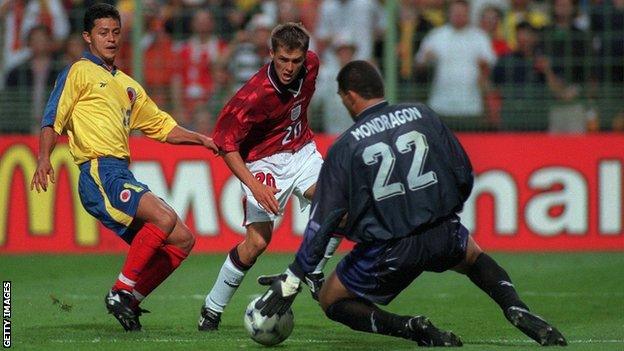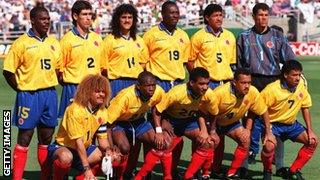Tim Vickery column: Veteran goalkeeper eyeing place in Rio
- Published
- comments

Darren Anderton whistled one inside the top corner of his near post and David Beckham beat him with a superbly taken free-kick. Otherwise, Colombia goalkeeper Farid Mondragon was the man England could not pass when the two sides met in the 1998 World Cup.
He came up with a succession of flying saves and was single-handedly responsible for the fact that England did not run up a cricket score.
The only Colombia player to enhance his reputation, Mondragon had every right to leave the field with his head held high. Instead he was inconsolable.
One of the lasting images from that night in Lens is of the distraught Colombian keeper at the end of the 2-0 defeat. Defeat meant that his side had been knocked out of the World Cup.
They have not been back since but are looking good for a place in Brazil next year.
Astonishingly, Mondragon has an excellent chance of making the trip. He is two months short of his 42nd birthday and, after playing in Argentina, Spain, France, Turkey, Germany and the United States, he is back home with Deportivo Cali, his original club.
Twenty years after his international debut, Mondragon is still in the Colombia squad, backing up first-choice keeper David Ospina.
He is twice the age of some of his team-mates and opponents - like Carlos Palomeque of Alianza Petrolera, who outsmarted him to score a late equaliser in a league match on Saturday. Mondragon underestimated Palomeque's left foot at a free-kick and failed to put enough men in his defensive wall.
It was a rare error of judgement, punished in a way that Beckham in his prime could not have bettered as Palomeque curled his shot around the wall and into the bottom far corner.
The quick, lively Palomeque is one of the standouts in the Colombia Under-20 side which won the South American championship earlier this year.
Another great hope is goalkeeper Cristian Bonilla, who was not even born when Mondragon first played for Colombia, but might soon be challenging the veteran for a place in the senior squad.
There are other, more experienced options for the goalkeeping position, such as Luis Martinez, from the 2011 Copa America, or Robinson Zapata of Millonarios. So why persevere with a keeper as old as Mondragon, whose reflexes cannot last for ever?
It is perhaps true that none of the contenders can quite match Mondragon's combination of goalkeeping virtues - his positional sense, authority and continued athleticism.
But part of the answer may also have something to do with the secrets of the dressing room, an environment which is a closed world to fans and journalists alike, and to which even ex-players are often given only fleeting access.
Across time and cultures, one lesson often comes across strongly from World Cup-winning coaches - squad members who do not play can be as important as those who do. They help set the emotional tone. A team is a blend of playing characteristics. A squad can be a blend of personal characteristics.
Over the last six years, for example, Uruguay have consistently found a place in their squad for centre forward Sebastian Abreu and midfielder Sebastian Eguren.
The pair of them get little time on the field - the height of Abreu can be useful for a late assault and Eguren can add some thrust - but that hardly seems to be the point. They are consistently called up for their impact off the field, where their strength of personality makes them important leaders.
We outsiders never see this. We witness and can assess the end result - the team's performance on the pitch. But the psychological building blocks that sustain the performance are put together outside our field of vision.
The general principle, though, seems clear. In football the glory is both individual and collective, and the tension between the two is always liable to come to the surface. Teams function better when the most experienced and respected figures are saying the right things in the dressing room.
In the case of Farid Mondragon, there is probably more to it that merely saying the right things; the veteran keeper also symbolises them.

A talented Colombian side failed to qualify from the group stages at the 1994 World Cup
Part of Colombia's recent problems have been tied up with a loss of footballing identity. The traumatic events of the 1994 World Cup - when the team buckled under exceptional pressure and defender Andres Escobar was murdered - made it easy to forget just how good that side was. But Mondragon needs no reminding.
He was there, playing in some of the warm-up matches and sitting on the substitutes bench during the tournament. He is a living, breathing connection to the team of Carlos Valderrama and company - whose hypnotic passing current Colombia coach Jose Pekerman is trying to restore.
Then there is Mondragon's reaction to World Cup elimination four years later. Nobody would have thought ill of him had Mondragon walked off the field after the England game basking in the glory of a great individual display.
Indeed for a goalkeeper there could hardly be a better way to bow out of the tournament than as the lone hero of a well-beaten side.
Instead, his emotional state showed that he put the needs of the team over those of himself - and coaches can never have too many players of that type.
Comments on the piece in the space provided. Questions on South American football to vickerycolumn@hotmail.com and I'll pick out a couple for next week.
From last week's postbag:
Q. Erik Lamela and Ignacio Scocco have been in terrific form for their clubs this season. What are the chances of them being part of Argentina's World Cup squad? Toby Millard
A. Both have been included relatively recently, though in Scocco's case it was in a squad of domestically based players. I do think he has a chance, though. He might not be a big target man centre-forward, but he has some penalty area presence and moves outside the area with fluidity and intelligence. He might be a usual reserve for Gonzalo Higuain, given that Argentina's strikers move wide to create space for Lionel Messi.
I'm a fan of Lamela, too, but he maybe faces a harder battle to get in because of the depth of competition - with Javier Pastore, for example. But Lamela combines well and I would love to see him given a chance to line up alongside Messi in a friendly, taking the role currently filled by Angel Di Maria. It would be an interesting experiment, especially for those times when Argentina want more controlled possession.
I was wondering how David Luiz is seen in Brazil. I know he plays at centre-back for the national team, but he has been having a great season at Chelsea playing in the holding midfield role.
Q. Do you think with Thiago Silva back fit and Dante coming in that Brazil coach Scolari will push him forward to play in the role that Gilberto Silva filled in 2002? Derek Molloy
A. Watch this space! June is the key month here. With friendlies against England and France and the Confederations Cup, Scolari at last will have time together with his players and I'm sure he will be thinking of an experiment along the lines you mention.
Defensive midfield is a position he has yet to sort out and, as you say, with Dante slotting in so well it makes sense to have a look at the option of David Luiz in front of the centre-backs, a position which may showcase his strengths and hide his weaknesses.
- Published8 April 2013
- Published1 April 2013
- Published25 March 2013
- Published18 March 2013